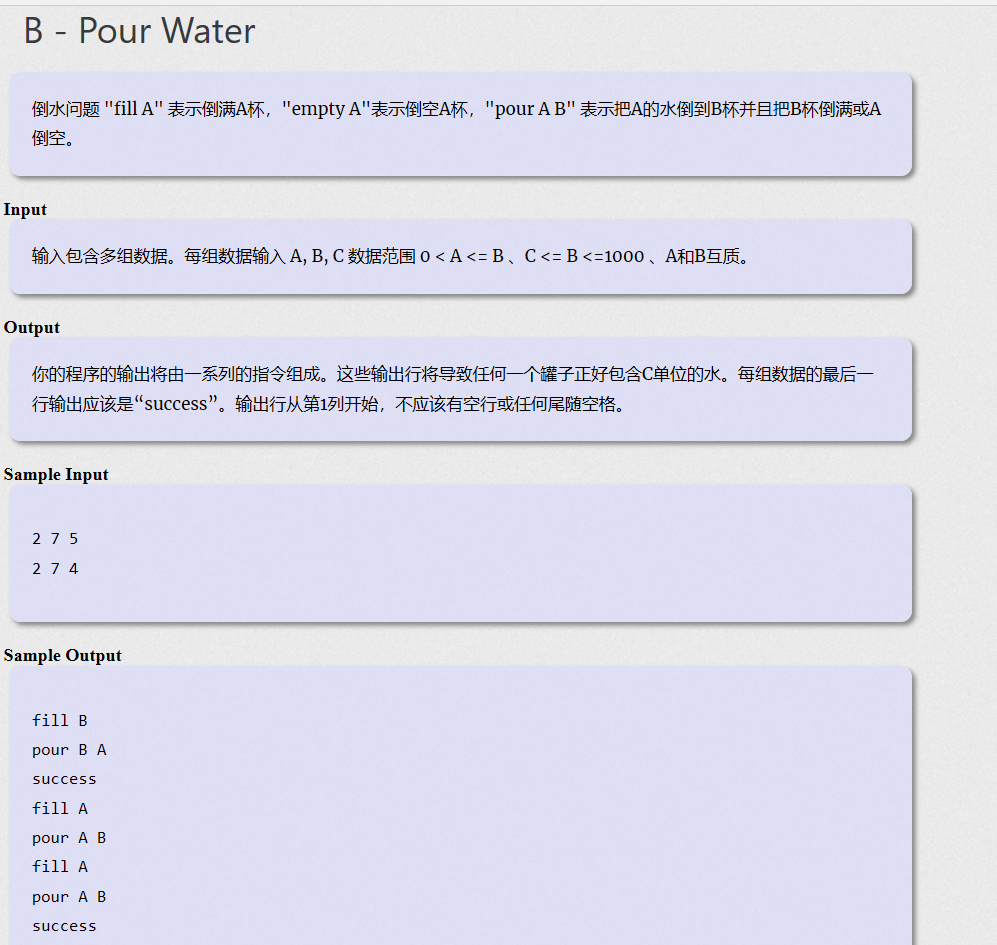倒水问题
题目
:两个容量不同且互质的杯子相互倒水(相互倒水时必须将其中一个杯子倒水或者倒空,不存在倒半杯的情况,要不然谁也不能确定倒了多少升水不是),直到倒出C升的水。
题目详细描述如下:

思路
:
本道题主要考察bfs,就是从水量(0,0)的时候一直倒水至(C,x)或者(x,C),x为未知量。为了不重复之前的倒水步骤(即陷入死循环),必须对每一个到达过的水量进行标记。然后将六种倒水状态分别编辑成一个函数,例如“empty A”就是将A中的水倒空,B中水量不变。在进行每一层bfs的时候,依次执行六个操作(fill A/fill B/empty A/empty B/pour A to B/po),直到倒出C升的水。为了在倒完水之后回溯整个倒水过程,需要记录下每一次倒水之前的水量与倒水之后的水量。
函数解释与方法选择
:
1.首先进行bfs所以选择了队列,不再具体说明。
2.选择使用pair记录了每一次的水量。
3.选择map记录每次倒水前与倒水后杯中的水量(key:倒水前,value:倒水后),这样便很容易用from[倒水后]的方法回溯倒水过程,同时还可以判断当前倒水状态是否已存在(使用find函数)。
4.check函数检查该倒水状态是否存在,若不存在将当前倒水状态加入map。
5.print3函数,通过递归输出倒水的过程。
6.judge4函数,根据回溯的杯中水量判断进行的是六种倒水操作的哪一种。
说明:
写了好几版print和judge函数,功能一样,具体实现有所不同,最后采用的是print3和judge4!!!!(因为不愿意发生删除删错了的悲剧…就不删了)
PS:
bfs简易版题目:
https://blog.csdn.net/weixin_44876049/article/details/104637717
激动人心的代码:
#include <iostream>
#include <queue>
#include <vector>
#include <map>
#include <cstring>
using namespace std;
map<pair<int, int>, pair<int, int> > from;//t,f
queue<pair<int, int> > q;
int A, B, C;//容量
int x[1000];
pair<int, int> AtoB(pair<int, int> &p)
{
pair<int, int> p1;
p1.first = max(0, p.first + p.second - B);
p1.second = min(B, p.first + p.second);
return p1;
}
pair<int, int> BtoA(pair<int, int> &p)
{
pair<int, int> p1;
p1.first = min(A, p.first + p.second);
p1.second = max(0, p.first + p.second - A);
return p1;
}
pair<int, int> emptyA(pair<int, int> &p)
{
pair<int, int> p1(0, p.second);
return p1;
}
pair<int, int> emptyB(pair<int, int> &p)
{
pair<int, int> p1(p.first, 0);
return p1;
}
pair<int, int> fillA(pair<int, int> &p)
{
pair<int, int> p1(A, p.second);
return p1;
}
pair<int, int> fillB(pair<int, int> &p)
{
pair<int, int> p1(p.first, B);
return p1;
}
void check(pair<int, int> &f, pair<int, int> &t)
{
if (from.find(t) == from.end())//没有经历过这种情况
{
from[t] = f;
q.push(t);
}
}
void judge(pair<int, int> &f, pair<int, int> &t)
{
if (f.first != 0 && t.first == 0 && f.second == t.second)
cout << "empty A" << endl;
else if (f.second != 0 && t.second == 0 && f.first == t.first)
cout << "empty B" << endl;
else if (f.first != A && t.first == A && f.second == t.second)
cout << "fill A" << endl;
else if (f.second != B && t.second == B && f.first == t.first)
cout << "fill A" << endl;
else if (f.second < t.second)
cout << "pour A B" << endl;
else
cout << "pour B A" << endl;
}
int judge2(pair<int, int> &f, pair<int, int> &t)
{
if (f.first != 0 && t.first == 0 && f.second == t.second)
//cout << "empty A" << endl;
return 1;
else if (f.second != 0 && t.second == 0 && f.first == t.first)
//cout << "empty B" << endl;
return 2;
else if (f.first != A && t.first == A && f.second == t.second)
//cout << "fill A" << endl;
return 3;
else if (f.second != B && t.second == B && f.first == t.first)
//cout << "fill B" << endl;
return 4;
else if (f.second < t.second)
//cout << "pour A B" << endl;
return 5;
else
//cout << "pour B A" << endl;
return 6;
}
void print4(pair<int, int> &f, pair<int, int> &t)
{
if (f.first != 0 && t.first == 0 && f.second == t.second)
cout << "empty A" << endl;
else if (f.second != 0 && t.second == 0 && f.first == t.first)
cout << "empty B" << endl;
else if (f.first != A && t.first == A && f.second == t.second)
cout << "fill A" << endl;
else if (f.second != B && t.second == B && f.first == t.first)
cout << "fill B" << endl;
else if (f.second < t.second)
cout << "pour A B" << endl;
else
cout << "pour B A" << endl;
}
void print(pair<int, int> &p)
{
cout << "???" << endl;
pair<int, int> f = from[p];
if (p.first == 0 && p.second == 0)
{
judge(f, p);
}
else
{
return print(f);
judge(f, p);
cout << "go!" << endl;
}
}
void print2(pair<int, int> &p)
{
while (p.first!=0 || p.second!=0)
{
pair<int, int> f = from[p];
judge(f, p);
p = f;
}
}
void print3(pair<int, int> &p)
{
for(int i=999; i>=0;i--)
{
pair<int, int> f = from[p];
x[i] = judge2(f, p);
p = f;
if (p.first == 0 && p.second == 0)
break;
}
for (int i = 0; i < 1000; i++)
{
//cout << "aaa" << endl;
if (x[i] == 0)
continue;
switch (x[i])
{
case 1:
cout << "empty A" << endl;
break;
case 2:
cout << "empty B" << endl;
break;
case 3:
cout << "fill A" << endl;
break;
case 4:
cout << "fill B" << endl;
break;
case 5:
cout << "pour A B" << endl;
break;
default:
cout << "pour B A" << endl;
break;
}
}
}
void bfs()
{
pair<int, int> p1(0, 0);
q.push(p1);
from[p1] = p1;
int a, b;
while (!q.empty())
{
memset(x, 0, sizeof x);
pair<int, int> f = q.front();
q.pop();
pair<int, int> f1 = fillA(f);
check(f, f1);
pair<int, int> f2 = fillB(f);
check(f, f2);
pair<int, int> f3 = emptyA(f);
check(f, f3);
pair<int, int> f4 = emptyB(f);
check(f, f4);
pair<int, int> f5 = BtoA(f);
check(f, f5);
pair<int, int> f6 = AtoB(f);
check(f, f6);
if (f.first == C || f.second == C)
{
a = f.first;
b = f.second;
break;
}
}
pair<int, int> result(a, b);
print3(result);
cout << "success" << endl;
}
int main()
{
while (cin >> A >> B >> C)
{
bfs();
from.clear();
while (!q.empty()) q.pop();
}
return 0;
}